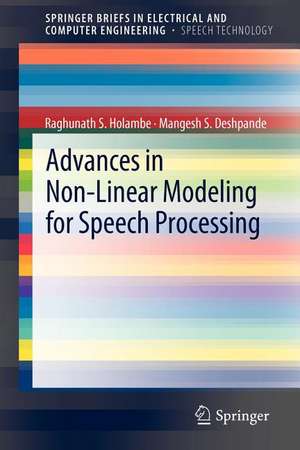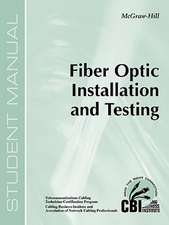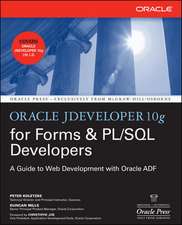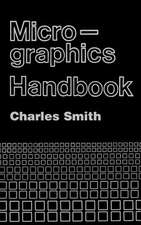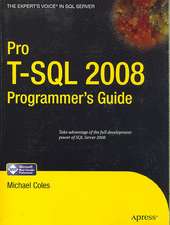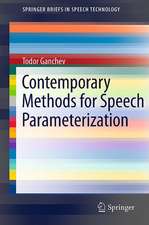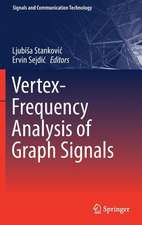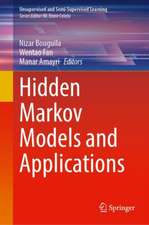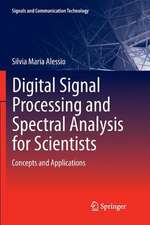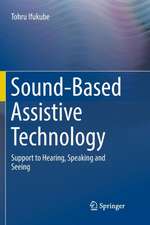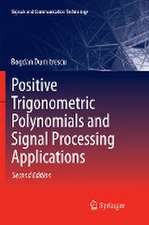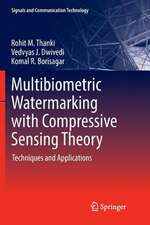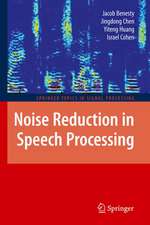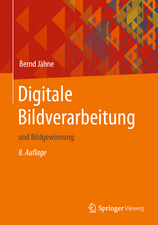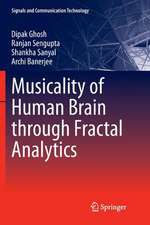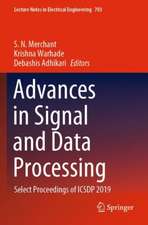Advances in Non-Linear Modeling for Speech Processing: SpringerBriefs in Speech Technology
Autor Raghunath S. Holambe, Mangesh S. Deshpandeen Limba Engleză Paperback – 21 feb 2012
Non-linear aeroacoustic modeling approach is used to estimate the important fine-structure speech events, which are not revealed by the short time Fourier transform (STFT). This aeroacostic modeling approach provides the impetus for the high resolution Teager energy operator (TEO). This operator is characterized by a time resolution that can track rapid signal energy changes within a glottal cycle.
The cepstral features like linear prediction cepstral coefficients (LPCC) and mel frequency cepstral coefficients (MFCC) are computed from the magnitude spectrum of the speech frame and the phase spectra is neglected. To overcome the problem of neglecting the phase spectra, the speech production system can be represented as an amplitude modulation-frequency modulation (AM-FM) model. To demodulate the speech signal, to estimation the amplitude envelope and instantaneous frequency components, the energy separation algorithm (ESA) and the Hilbert transform demodulation (HTD) algorithm are discussed.
Different features derived using above non-linear modeling techniques are used to develop a speaker identification system. Finally, it is shown that, the fusion of speech production and speech perception mechanisms can lead to a robust feature set.
Din seria SpringerBriefs in Speech Technology
-
 Preț: 357.70 lei
Preț: 357.70 lei -
 Preț: 344.64 lei
Preț: 344.64 lei -
 Preț: 337.37 lei
Preț: 337.37 lei -
 Preț: 379.48 lei
Preț: 379.48 lei -
 Preț: 378.12 lei
Preț: 378.12 lei -
 Preț: 387.38 lei
Preț: 387.38 lei -
 Preț: 375.45 lei
Preț: 375.45 lei -
 Preț: 377.95 lei
Preț: 377.95 lei - 20%
 Preț: 293.48 lei
Preț: 293.48 lei -
 Preț: 375.62 lei
Preț: 375.62 lei -
 Preț: 379.09 lei
Preț: 379.09 lei -
 Preț: 379.09 lei
Preț: 379.09 lei -
 Preț: 377.18 lei
Preț: 377.18 lei -
 Preț: 381.98 lei
Preț: 381.98 lei -
 Preț: 380.45 lei
Preț: 380.45 lei -
 Preț: 344.52 lei
Preț: 344.52 lei -
 Preț: 375.62 lei
Preț: 375.62 lei -
 Preț: 375.45 lei
Preț: 375.45 lei - 20%
 Preț: 322.02 lei
Preț: 322.02 lei -
 Preț: 377.57 lei
Preț: 377.57 lei -
 Preț: 379.09 lei
Preț: 379.09 lei -
 Preț: 378.54 lei
Preț: 378.54 lei -
 Preț: 374.68 lei
Preț: 374.68 lei -
 Preț: 378.92 lei
Preț: 378.92 lei -
 Preț: 343.51 lei
Preț: 343.51 lei -
 Preț: 441.85 lei
Preț: 441.85 lei -
 Preț: 375.45 lei
Preț: 375.45 lei -
 Preț: 376.22 lei
Preț: 376.22 lei -
 Preț: 379.68 lei
Preț: 379.68 lei -
 Preț: 375.07 lei
Preț: 375.07 lei -
 Preț: 410.94 lei
Preț: 410.94 lei -
 Preț: 377.35 lei
Preț: 377.35 lei -
 Preț: 344.75 lei
Preț: 344.75 lei -
 Preț: 379.68 lei
Preț: 379.68 lei -
 Preț: 375.62 lei
Preț: 375.62 lei -
 Preț: 376.22 lei
Preț: 376.22 lei -
 Preț: 377.73 lei
Preț: 377.73 lei
Preț: 377.95 lei
Nou
Puncte Express: 567
Preț estimativ în valută:
72.33€ • 75.23$ • 59.71£
72.33€ • 75.23$ • 59.71£
Carte tipărită la comandă
Livrare economică 14-28 aprilie
Preluare comenzi: 021 569.72.76
Specificații
ISBN-13: 9781461415046
ISBN-10: 1461415047
Pagini: 112
Ilustrații: XIII, 102 p. 32 illus.
Dimensiuni: 155 x 235 x 6 mm
Greutate: 0.18 kg
Ediția:2012
Editura: Springer
Colecția Springer
Seria SpringerBriefs in Speech Technology
Locul publicării:New York, NY, United States
ISBN-10: 1461415047
Pagini: 112
Ilustrații: XIII, 102 p. 32 illus.
Dimensiuni: 155 x 235 x 6 mm
Greutate: 0.18 kg
Ediția:2012
Editura: Springer
Colecția Springer
Seria SpringerBriefs in Speech Technology
Locul publicării:New York, NY, United States
Public țintă
ResearchCuprins
From the Contents: Speech production mechanism.- Linear speech production model.- Nonlinearity in speech production.- Nonlinear dynamic system model.- Speech perception mechanism.- Summary.- Autoregressive models.- Linear autoregressive model.- Nonlinear autoregressive model.- Nonlinear measurement and modeling using Teager energy operator.- Teager energy operator (TEO).- Vocal tract aeroacoustic flow.- Energy measurement.- Energy separation.- Noise suppression using TEO.
Caracteristici
Nonlinear aspects of speech signals are covered in depth Covers nonlinear modeling techniques from the context of speaker identification New insight is explored to combine the speech production and speech perception systems Includes supplementary material: sn.pub/extras
Descriere
Advances in Non-Linear Modeling for Speech Processing includes advanced topics in non-linear estimation and modeling techniques along with their applications to speaker recognition. Non-linear aeroacoustic modeling approach is used to estimate the important fine-structure speech events, which are not revealed by the short time Fourier transform (STFT). This aeroacostic modeling approach provides the impetus for the high resolution Teager energy operator (TEO).
This operator is characterized by a time resolution that can track rapid signal energy changes within a glottal cycle. The cepstral features like linear prediction cepstral coefficients (LPCC) and mel frequency cepstral coefficients (MFCC) are computed from the magnitude spectrum of the speech frame and the phase spectra is neglected. To overcome the problem of neglecting the phase spectra, the speech production system can be represented as an amplitude modulation-frequency modulation (AM-FM) model.
To demodulate the speech signal, to estimation the amplitude envelope and instantaneous frequency components, the energy separation algorithm (ESA) and the Hilbert transform demodulation (HTD) algorithm are discussed. Different features derived using above non-linear modeling techniques are used to develop a speaker identification system. Finally, it is shown that, the fusion of speech production and speech perception mechanisms can lead to a robust feature set.
